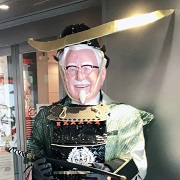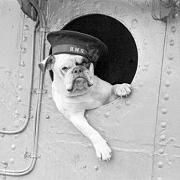|
LimburgLimbo posted:There have been a lot of articles about the conservatives trying to push through constitutional amendments and the recent confirmation of a small increase in Japan's defense budget saw a lot of press, a fair amount of it somewhat hyperbolic. The Japanese electorate has been pretty distressed by the states secrets law, at least relative to their normal state of indifference. Abe is pushing the limits of his power and if he pushes a little bit more we all might see some surprising things from Japanese politics. The thing to remember is that while the Japanese electorate is not very liberal or conservative, it likes to punish. Therefore, Abe is on thin ice all the time. There is a stereotype that the Japanese will go along with anything. This is untrue; they have a higher tolerance for the status quo before they demand everything suddenly changes.
|
|
|
|

|
| # ? May 11, 2024 21:43 |
|
Wibbleman posted:I think, if its the same case. That back in 2012, the Korean supreme court decided that the existence of the 1965 treaty, which resolved all issues of compensation (between the governments) didn't invalidate the right of individual families to seek compensation. So some families took Mitsubishi to court to seek compensation for their relatives who were conscripted into forced labor. I think the plaintiffs were using the western model after WW2 to sue the successor companies of the third reich who used slave labor. Volkswagen and Siemens paid large sums in the 1990s to settle those claims. California specifically passed a law in 1999 allowing such lawsuits to be filed in California against companies until 2010. What I think irritates the Koreans and Chinese so much is that Japanese textbooks whitewash the involvement of Japan in WW2. The Kim dynasty in NK base much of their reputation on fighting Japanese and much of their propaganda deals with Japanese "atrocities" during the occupation of the Korean peninsula. quote:When we did finally get there, it turned out only 19 of the book's 357 pages dealt with events between 1931 and 1945. A similar complaint is heard in the book Persian Puzzle: The only way to understand the twenty five year confrontation between Iran and the United States is to know the history of the relationship. Contained in that history are all of the elements of our current impasse. Most Iranians know that history - or some warped version of it - all too well. Most Americans know it too little. To a certain extent, that is the first of many profound differences that lie at the heart of our belligerent stand-off. One side forgets everything that happens, the other side can't/won't forget any of it.
|
|
|
|
The following people can swallow my dick wholly: Shinzo Abe,Chinese Foreign Minister Wang Yi,Japanese Ambassador to China Kitera Masato,Former Japanese Prime Minister Junichiro Koizumi. Edit: Also any nationalistic piece of garbage who tries to erect a monument to unending Asian hatred in my peaceful boring neighborhood. Gabriel Grub fucked around with this message at 16:27 on Dec 26, 2013 |
|
|
|
Your list somehow missed Hashimoto and Ishihara.
|
|
|
|
Kenishi posted:Your list somehow missed Hashimoto and Ishihara. I would not want to give the impression that Tokyo was particularly important or representative of Japan, because it is not.
|
|
|
|
Lemmi Caution posted:I would not want to give the impression that Tokyo was particularly important or representative of Japan, because it is not. Yes the political and economic center of the nation, the greater metropolitan area of which comprises something like a third of the the population of the entire nation, isn't particularly important.
|
|
|
|
Yet they cannot wrest political control from the inaka, and the vast majority of the country has never even been to Tokyo. Tokyo is great; may the great nation of Japan never be defined nor contolled by it.
|
|
|
|
Keep on dreaming, kid.
|
|
|
|
LimburgLimbo posted:Keep on dreaming, kid. If you continue to try to understand Japanese politics and culture based on Tokyo, it is you who will always be dreaming. JPop all comes from there though.
|
|
|
|
Lemmi Caution posted:If you continue to try to understand Japanese politics and culture based on Tokyo, it is you who will always be dreaming. JPop all comes from there though. You've more or less gotten this the wrong way around - J-Pop stars are pretty much all from the boondocks (Okinawa punches well above it's weight here), but Tokyo is the home of Japanese politics and culture.
|
|
|
|
Huttan posted:What I think irritates the Koreans and Chinese so much is that Japanese textbooks whitewash the involvement of Japan in WW2. The Kim dynasty in NK base much of their reputation on fighting Japanese and much of their propaganda deals with Japanese "atrocities" during the occupation of the Korean peninsula. Remember this article is from a person who studied history in Japan 17 years ago, so the textbooks have moved on somewhat from there. It's important to note that while being very offensive, people like Nobukatsu Fujioka are the rough equivalent to the moon landing deniers in America, or chem-trails etc. The Stanford study "Divided Memories" here has interesting comments on the situation. quote:What the research uncovered was quite different from the common perception found in media, not only in Asia but also in the United States. Far from being nationalistic, Japanese textbooks seem the least likely to stir patriotic passions. They do not celebrate war, they do not stress the importance of the military, and they tell no tales of battlefield heroism. Instead they offer a rather dry chronology of events without much interpretive narrative. quote:The patriotic passions of the Chinese, Korean, and American accounts of the war provide a striking contrast to what Duus, a preeminent historian of modern Japan, describes as the “muted, neutral, and almost bland” tone of Japanese textbooks. This may surprise those whose view of Japanese textbooks is derived from accounts that conflate the content of the rarely used revisionist textbook with the textbooks that are actually on the desks of almost all Japanese high school students. Now this doesn't mean that there haven't been textbooks in the past that have whitewashed or skipped the Second Sino-Japanese war/抗日战争. And that there won't be further attempts in the future. Just that the situation is quite different to the common public opinion. Note this is only a single study (though there arn't any counter studies) so doesn't reflect a academic consensus. And here is pretty much the outcome from the right wing textbook revision attempt that tends to be the main example used for whitewashing ("The New History" textbook). Kathleen Woods Masalski posted:http://spice.stanford.edu/docs/134
|
|
|
|
Wibbleman posted:And here is pretty much the outcome from the right wing textbook revision attempt that tends to be the main example used for whitewashing ("The New History" textbook). Isn't there this, though, from Japan Unbound, showing that the New History textbook and a media campaign involving it led to whitewashing in other more "moderate" Japanese history textbooks? John Nathan, p150-2 posted:To combat the media campaign against adoption of the text, Fuso released a commercial edition available for sale to the public in bookstores in June 2001. Though there is no law preventing such tactics, it was the first time a textbook had been marketed to the public, and critics objected that Fuso was attempting to influence the selection board. Members of the society and others took the more reasonable position that the competing texts should all be made available to allow the public to compare and judge for itself. In its first two months on the market, the New History was among the ten best-selling titles in Japan, and it had sold 720,000 copies as of February 2002, a figure that cannot be explaiend away as a function of mere curiosity inflamed by the controversy. (I really didn't want to dig out this book again after using it in a research paper over a year and a half ago since it's so drat depressing to me, but then I'll bear in mind that this was ten years ago and the textbook situation might have changed since then) Jerry Manderbilt fucked around with this message at 00:00 on Dec 27, 2013 |
|
|
|
ookiimarukochan posted:You've more or less gotten this the wrong way around - J-Pop stars are pretty much all from the boondocks (Okinawa punches well above it's weight here), but Tokyo is the home of Japanese politics and culture. http://www.japantimes.co.jp/news/20...d/#.Ury-IziRUuo
|
|
|
|
Zo posted:Inaka votes are worth up to five times more than city votes due to depopulation and house seat allocations not being updated so it's pretty clear where real political control lies regardless of how many people are in tokyo. Oh, there's a rotten borough situation going on, that's true, but looking at the UK for instance, votes in London are worth less than anywhere else in the country, and Scottish votes are worth more (more so than you'd guess even by looking at the MPs to voters ration, as Scottish MPs can and do vote on matters related to England/Wales/Northern Ireland where the equivalent Scottish matters are devolved to the Scottish parliament)
|
|
|
|
I've always been impressed by how straightforward and not nationalistic the museums I've visited in Japan are (other than the Yasukuni Shrine's comedy war museum but that is a special case) compared to other ones in Asia. The Beijing museum wasn't too bad, the Seoul one is a mix of decent and utter bullshit, and there's one in my city that claims Korean civilization invented whaling 12,000 years ago among other things. Whereas the main history museum in Tokyo has a whole exhibition room straight up saying how Koreans brought Buddhism and centralized government/civilization to the disorganized tribes in Japan. I've read that the denial textbooks are basically like evolution being taken out of Kansas textbooks or whatever, the national government has no role in textbook choices and the lovely ones are used by very few places. Anyone know if that is true?
|
|
|
|
To my knowledge it's even less severe than something like Kansas. I seem to recall that perhaps a dozen tiny private schools in the whole country use them.
|
|
|
|
While outright denial isn't very widespread, there is a pretty serious amount of whitewashing in general - the textbooks my schools used only made a single mention of the sexual slavery issue, didn't define the word (what does 'comfort women' mean to someone who has never seen it before or encountered the issue? Nothing.), and pretty much glossed over all of the atrocities in East Asia, only talking about them for about a quarter of a single page. Compare that to the multiple pages spent on Nagasaki and Hiroshima alone. Really the coverage of World War 2 in general was pretty terrible, especially considering how important an event it was for the reshaping of Japan.
|
|
|
|
True enough. Not to apologize for them, but I also think Japan gets a bit of unfair poo poo for it because it's World War 2, and Germany has been so good about acknowledging what they did and trying to make things right. But no one points out that Germany is an outlier; most countries that have done large scale horrific poo poo are much more like Japan and just don't talk about it much. Soviet Union under Stalin, China with Mao, Turkey with the Armenian Genocide, Belgium in the Congo, et cetera. Japan is special because it has a bunch of other countries constantly rubbing their noses in it. Which, if we were being intelligent and objective about it, is the reason why Japan should look at Germany and do that instead of what they've been doing. Maybe they're being targeted about it, but ignoring it isn't going to make it go away. Confronting it might.
|
|
|
|
The Russians talk about what Stalin did all the time. They just think it was great. Likewise with China. When your history is a bunch of "we were backwards and got the poo poo stomped out of us" someone who changes it to "we modernized, beat off a superior foe and lots of people died but gently caress 'em WORLD POWER WOO" is obviously going to get a kind treatment in popular memory.
|
|
|
|
Forums Terrorist posted:The Russians talk about what Stalin did all the time. They just think it was great. Likewise with China. When your history is a bunch of "we were backwards and got the poo poo stomped out of us" someone who changes it to "we modernized, beat off a superior foe and lots of people died but gently caress 'em WORLD POWER WOO" is obviously going to get a kind treatment in popular memory. I think that counts as whitewashing. I've had a whole lot of Chinese students who had literally no clue about Mao being responsible for anybody dying. Not denial, they just had never heard of it before.
|
|
|
|
Eh, fair enough. I'm not as familiar with China, but I do know that Stalin is mad popular in Russia. Second most popular Russian leader, behind Brezhnev.
|
|
|
|
Grand Fromage posted:I think that counts as whitewashing. I've had a whole lot of Chinese students who had literally no clue about Mao being responsible for anybody dying. Not denial, they just had never heard of it before. Anecdotally, even my Chinese history professor believed that the response to stuff like the Hundred-Flowers Campaign was more him just being unable to handle criticism and not expecting any, rather than a deliberate purge of intellectuals. Though he unabashedly criticized the Great Leap Forward and the Cultural Revolution, and the post-Tiananmen crackdown stuff.
|
|
|
|
Forums Terrorist posted:Eh, fair enough. I'm not as familiar with China, but I do know that Stalin is mad popular in Russia. Second most popular Russian leader, behind Brezhnev. The Stalin thing is bizarre. I wonder how many of those people are aware of things like the Holodomor though. Actually I don't want to know, I'd rather just assume they don't instead of the idea of huge numbers of Russians being totally cool with that. To throw in another, the US is pretty good about acknowledging what we did to the Native Americans these days but we had a long period of not talking about it there. I guess the larger question is why Germany responded so differently and why we have such trouble doing something as basic as admitting facts. And would Germany have done the same thing if it weren't for denazification and the like? Grand Fromage fucked around with this message at 16:24 on Dec 27, 2013 |
|
|
|
Grand Fromage posted:Which, if we were being intelligent and objective about it, is the reason why Japan should look at Germany and do that instead of what they've been doing. Maybe they're being targeted about it, but ignoring it isn't going to make it go away. Confronting it might. Japan is not going to stop being targeted until the countries that target it (especially China) have a better villain to redirect anger at whenever internal affairs aren't so great. Its better to continue as is than pay a bunch of reparation money out and get nothing. Not to mention all of the non-WWII related conflicts with Korea (Dokdo, etc) that just aren't going to go away with yet another apology.
|
|
|
|
Grand Fromage posted:The Stalin thing is bizarre. I wonder how many of those people are aware of things like the Holodomor though. Actually I don't want to know, I'd rather just assume they don't instead of the idea of huge numbers of Russians being totally cool with that. Denazification was a bit of a joke, to be perfectly honest. It took until the 60ies before the not-quite-worst of the Nazis were purged from office, and even then some remained. i think what mattered more is that Germany always considered itself a western nation and desperately wanted to be acknowledged as an equal by the "older" nation states (France and Britain first among them). Becoming, for the lack of a better term, "barbaric" between 1933 and 1945 forced a brutal shift in thinking in Germany. You can't claim to be a civilized, well cultured western nation and herd people into gas chambers. Yes, other nation states have done horrible, horrible things (France and Britain probably first among them), but most German historians would still argue that the Holocaust has a special quality all of its own. It wasn't "a" genocide, it was "the" Genocide. The only way to possibly be considered civilized after that is to make amends where you can, get on your knees and beg for mercy. I think one thing the Japanese atrocities lack is the premeditation of the Holocaust. At least to some degree, there is some truth to the claim that any atrocity was the work of junior officers or enlisted soldiers, not government policy (government policy was "We don't give a poo poo about you, you lost and should be grateful that we even acknowledge your existence"). Come to think of it, Bismarck is still relatively popular in Germany, even though he started three wars and ordered brutal crackdowns on Poles and Socialists. I guess at least he won the wars he started.
|
|
|
|
ArchangeI posted:At least to some degree, there is some truth to the claim that any atrocity was the work of junior officers or enlisted soldiers, not government policy No. quote:After the start of the Asia Pacific War, the Ministry of War tried to have the Central Comand supervise all dispatches of comfort women to Southeast Asia and the Pacific region. In a telegram from the Vice Minister of War to the Chief of the General Staff of the Southern Army and the Chief of Staff of the 23rd Army dated November 18, 1942, the Vice Minister confirmed that procedures for the dispatch of "both necessary personnel for military 'shuho' and comfort women" would be in accordance with Article I, Item 7 of Secret Army Document No. 1283 issued on April 23, 1942. Then you get into the whole Unit 7-whatever live-action vivisectioning people and all that, something that can't really take place on that sort of scale without some manner of approval from the top. Some of the more one-off stuff like POWs being eaten and what not, sure, but a whole bunch of evil poo poo was known and approved of from the top right down to the bottom. Sheep fucked around with this message at 18:26 on Dec 27, 2013 |
|
|
|
Sheep posted:No. There is still a difference between how the Japanese Army acted in China and the Einsatzgruppen of the SS in Russia.
|
|
|
|
ArchangeI posted:There is still a difference between how the Japanese Army acted in China and the Einsatzgruppen of the SS in Russia. No one is disputing that, but what you said - that the atrocities were "the work of junior officers or enlisted soldiers, not government policy" is patently false in a great number of cases ranging from sexual slavery to forced labor to execution of POWs, the list goes on and on.
|
|
|
|
Sheep posted:No one is disputing that, but what you said - that the atrocities were "the work of junior officers or enlisted soldiers, not government policy" is patently false in a great number of cases ranging from sexual slavery to forced labor to execution of POWs, the list goes on and on. Read what I wrote, I never claimed that all Japanese atrocities were the product of rogue soldiers.
|
|
|
|
Grand Fromage posted:I've always been impressed by how straightforward and not nationalistic the museums I've visited in Japan are (other than the Yasukuni Shrine's comedy war museum but that is a special case) compared to other ones in Asia. The Beijing museum wasn't too bad, the Seoul one is a mix of decent and utter bullshit, and there's one in my city that claims Korean civilization invented whaling 12,000 years ago among other things. Whereas the main history museum in Tokyo has a whole exhibition room straight up saying how Koreans brought Buddhism and centralized government/civilization to the disorganized tribes in Japan. Well, South Korea never took over and colonized Japan and China never cut a brutal swath of destruction throughout much of Japan. It's not surprising that countries that were the victims of atrocities are more keen on public displays of overheated nationalism than countries that were the perpetrators. Of course that doesn't make ridiculous nationalism (e.g. still banning Japanese TV shows) correct, but I think it is worth considering in mitigation. More importantly, I feel like the dominant narrative of the war in Japan isn't accurate at all. It goes roughly like so: "Japan accidentally slipped into war with China and then again was drawn into a larger war it wasn't excited about participating in. During the war, both sides did some very bad things, the worst of which were the atomic bombings of Hiroshima and Nagasaki." While this may not be as forthrightly stupid as saying that Korea invented everything or all the bullshit claims about how China (or, worse, the CCP) played a key role in defeating Japan, it's still an enormous distortion of the historical record. For years, Japan's apologies to other nations of the "we are deeply regretful that bad things happened" variety. When a non-LDP government came to power this changed and since then every government has stuck to the apology statements made during the brief period of non-LDP rule, but a number of leaders have cast doubt on the sincerity of their affirmations. quote:Read what I wrote, I never claimed that all Japanese atrocities were the product of rogue soldiers. Pretty much every other regime (maybe not the Khmer Rouge) comes off favorably by comparison to Nazi Germany, so saying that Japan's crimes weren't as bad doesn't seem like a fruitful angle of attack.
|
|
|
|
dilbertschalter posted:Pretty much every other regime (maybe not the Khmer Rouge) comes off favorably by comparison to Nazi Germany, so saying that Japan's crimes weren't as bad doesn't seem like a fruitful angle of attack. Its not about how bad it was, it is about how their atrocities relate to the political culture of the country. Germany made a predetermined effort to murder entire ethnic groups. It is at least debatable whether the Japanese did the same, or if they just didn't care in any way, shape, or form if entire ethnic groups died because of their policies. this is especially important since the original question was why Germany handled the aftermath of its war crimes relatively well while Japan did not.
|
|
|
|
Grand Fromage posted:True enough. Not to apologize for them, but I also think Japan gets a bit of unfair poo poo for it because it's World War 2, and Germany has been so good about acknowledging what they did and trying to make things right. But no one points out that Germany is an outlier; most countries that have done large scale horrific poo poo are much more like Japan and just don't talk about it much. Soviet Union under Stalin, China with Mao, Turkey with the Armenian Genocide, Belgium in the Congo, et cetera. Japan is special because it has a bunch of other countries constantly rubbing their noses in it. Well technically Germany hasn't apologized for its colonial adventures. So in that respect Japan has actually done the most as reparations for colonial crap. And on the WW2 apologies, the German apologies haven't been rejected at every step for not being sincere enough etc. Some people like to think that the process went straight to Willy Brant on his knees, but it was a long road of many little steps before that. Reconciliation and forgiveness needs willing participants on both sides. When the other side doesn't want to be involved, then the person apologizing gets less and less sincere, and then gives up, as has pretty much happened with Japan. There is no political capital in being more apologetic, so they won't go that path until there is a sign from South Korea and China that it will bear fruit.
|
|
|
|
Why would either Japan or Korea/China want to throw away this great racket they have going? Every time the PM goes to Yasukuni it's a win button for the conservatives in all three countries.
|
|
|
|
Samurai Sanders posted:Why would either Japan or Korea/China want to throw away this great racket they have going? Every time the PM goes to Yasukuni it's a win button for the conservatives in all three countries. Well that's pretty much what I am saying. Real reconciliation will not happen until all 3 countries actually want it. And despite the demands of the South Koreans for a "Willy Brant moment" they would make more unachievable demands if there ever was a real movement to reconcile.
|
|
|
|
Samurai Sanders posted:Why would either Japan or Korea/China want to throw away this great racket they have going? Every time the PM goes to Yasukuni it's a win button for the conservatives in all three countries. The legitimacy of the Chinese Communist Party itself today is based upon the belief that they will protect China from external threats, such as "aggressor nations" like Japan, South Korea, and the United States. Without this propaganda, the party would be in a lot of trouble. The difference between Germany and Japan is that Wiemar Germany was a democracy while Imperial Japan wasn't. Even though there was a Diet, the Japanese Empire was ruled by an oligarchical government that briefly flirted with democracy before being strangled to death by militarism. The German people know that they elected the Nazis and allowed the Nazis to do what they wanted once they came into power because the Nazis seemed to be getting results with their economic programs. You can't say the same about the Japanese people because Japan wasn't a real democracy. The Imperial Japanese military also acted without restraint or oversight throughout the 1930's. Arguably the only person who could have reigned them in, the Emperor Showa, was too weak and inexperienced to control them. The invasion of Manchuria, the formation of Manchukuo, and the push for war were all the work of the military and officers working within the military without civilian or popular consent. Couple this with the concept of "saving face" and you have the perfect storm for pretending like nothing happened.
|
|
|
|
RocknRollaAyatollah posted:The legitimacy of the Chinese Communist Party itself today is based upon the belief that they will protect China from external threats, such as "aggressor nations" like Japan, South Korea, and the United States. Without this propaganda, the party would be in a lot of trouble.
|
|
|
|
Zo posted:Hahahahah. Did you get this from a tom clancy book or something? It sounds ridiculous but it's something I've heard time and time again from Chinese people throughout China who believe it or know it's bullshit. Not just old people but young educated people as well. The Chinese government has sold the idea that smaller nations like Japan, the Philippines, and South Korea could be a feasible enough threat to China. I see it all the time in the papers, the news, and from people I encounter here. Couple this with CCTV constantly playing historical dramas featuring Japanese people brutalizing Chinese people all the time and people legitimately believe that if Japan was to build up a full military, Japanese marines would be landing at Shanghai. It went into extreme overdrive during the last spat of anti-Japanese riots to the point where I had college students getting nervous over jets flying low over the campus. RocknRollaAyatollah fucked around with this message at 09:15 on Dec 28, 2013 |
|
|
|
Speaking of Japanese war crimes, I was taking a look at a twitter account that posts historical pictures today and one of them was a picture of the battleship Bismarck, followed by some posts (by apparently mostly British people)talking about how the Yamato was bigger. About one or two tweets after mentioning the Yamato, the term "Japs" and "cruelest race" was used. Also a couple of stories about how the Japanese drove their grandads crazy and their uncle assaulted a Chinese person because of flashbacks. Really weird to me that people still talk like that. Oh well I guess! Edit: And by "talk like that" I mean it was in a school-yard kind of way. "Yeah, my uncle said that...."
|
|
|
|
What do you guys know about modern anarchist movements in Japan? I've met some already and I'm going to go check some other places out in Tokyo tomorrow but I was wondering if they have any sort of presence in the media.
|
|
|
|

|
| # ? May 11, 2024 21:43 |
|
Are you going to d-beat shows by any chance?
|
|
|


















